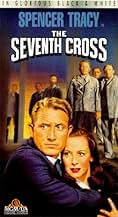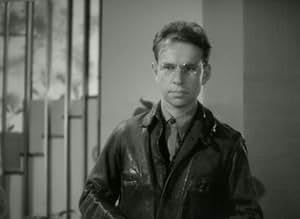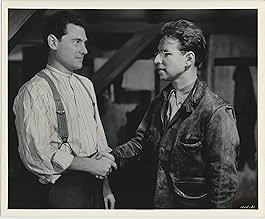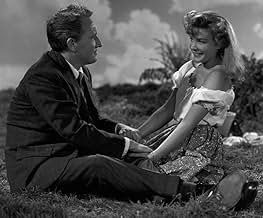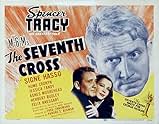IMDb-BEWERTUNG
7,4/10
3228
IHRE BEWERTUNG
Füge eine Handlung in deiner Sprache hinzuSeven men escape from a Nazi prison camp. One makes it to freedom.Seven men escape from a Nazi prison camp. One makes it to freedom.Seven men escape from a Nazi prison camp. One makes it to freedom.
- Regie
- Drehbuch
- Hauptbesetzung
- Für 1 Oscar nominiert
- 3 Gewinne & 1 Nominierung insgesamt
Empfohlene Bewertungen
Although slow moving, as was typical of Hollywood dramas of that era, The Seventh Cross tells a compelling story of the human spirit overcoming the evils of totalitarianism, and the recovery of one's faith in mankind during the midst of a societal distrust. George Heisel, portrayed by Spencer Tracey (one of his classic performances), is a broken man who has lost his faith in humanity who has escaped from a Nazi concentration camp with six others in the early days of the Reich when not all Germans loved the Fuerer and still had decent intentions. The Nazi Commandant vows to capture all seven and hang them on crosses he has built inside the camp. Six are caught, but Heisel escapes to Mainz, leaving the seventh cross empty. In Mainz, he realizes that he can't go to his old girlfriend (who has married a Nazi) or his family (his younger brother has joined the SS); almost all his friends have turned Nazi or been captured or killed save one, Paul Roeder and his wife Liesel (played by longtime married actors Hume Cronyn and Jessica Tandy). The Roeder's help get him in touch with members of the underground (including Paul Guilfolye, father of the actor on CSI) who help him escape to Holland. As he leaves, he realizes he must pay back not those who hurt him and broke him, but those that healed him, those who restored his faith in the God-given decency inherent in all of us if given the chance to rise to the surface. Sometimes it can arise in the most unlikely of places, but it is there.
To be placed alongside The Hiding Place, Schindler's List and Swing Kids. A must see for anyone who loves freedom.
To be placed alongside The Hiding Place, Schindler's List and Swing Kids. A must see for anyone who loves freedom.
A truly outstanding film that has not received the distinction that it deserves, despite a first-rate cast and compelling, as well as unique for the time, subject matter.
Spencer Tracy plays George Heisler, one of seven prisoners escaping from a German concentration camp in 1936. The film traces his attempt to establish contact with the German resistance movement, and along the way he changes slowly from a hardened cynic, and regains his faith in mankind.
This is not a bang-bang action movie. The lack of overt violence is what makes gives the film a searing authenticity. This is based on a novel by Anna Seghers, whose husband was indeed imprisoned in a concentration camp. True, people knowledgeable about the era will find many technical errors. For one thing, all of the actors, including especially Tracy and Ray Collins, are simply too overfed to be believable concentration camp inmates. Also the film shows the SA running the camp, when I do believe the SS was running the camps by '36. I was not especially happy with the handling of the single Jewish character, who is a token character and not portrayed very favorably.
But this was 1944, not 1994, and this was the first film from Hollywood to depict concentration camps. Also I can't think of very many films that have more successfully captured the terror and despair of Nazi Germany, and also more clearly impart a moral message. In that regard it is very faithful to the book.
The performances by all, even the bit characters, are superlative. This was one of Spencer Tracy's finest roles, and supposedly the melancholy of his performance was to a large extent influenced by word that a young friend, who he knew from Boy's Town, had died in combat.
Cronyn and Tandy play Liesl and Paul Roeder, who try to help George Heisler. What makes this a very fine drama is how even secondary and bit characters are shown to change and evolve. Watch for Helene Weigel, wife of Bertold Brecht, playing an old female janitor watching Roeder being taken away in a car. Weigel was the inspiration for Brecht's Mother Courage.
Seghers was a Communist, as are the major characters of the book, and the politics of the author simmers below the surface without being explicitly expressed. Look closely at the characters playing Nazis and concentration camp guards, and generally most of the characters with accents. The majority are refugees from Nazi Germany, adding great authenticity to their performances.
Spencer Tracy plays George Heisler, one of seven prisoners escaping from a German concentration camp in 1936. The film traces his attempt to establish contact with the German resistance movement, and along the way he changes slowly from a hardened cynic, and regains his faith in mankind.
This is not a bang-bang action movie. The lack of overt violence is what makes gives the film a searing authenticity. This is based on a novel by Anna Seghers, whose husband was indeed imprisoned in a concentration camp. True, people knowledgeable about the era will find many technical errors. For one thing, all of the actors, including especially Tracy and Ray Collins, are simply too overfed to be believable concentration camp inmates. Also the film shows the SA running the camp, when I do believe the SS was running the camps by '36. I was not especially happy with the handling of the single Jewish character, who is a token character and not portrayed very favorably.
But this was 1944, not 1994, and this was the first film from Hollywood to depict concentration camps. Also I can't think of very many films that have more successfully captured the terror and despair of Nazi Germany, and also more clearly impart a moral message. In that regard it is very faithful to the book.
The performances by all, even the bit characters, are superlative. This was one of Spencer Tracy's finest roles, and supposedly the melancholy of his performance was to a large extent influenced by word that a young friend, who he knew from Boy's Town, had died in combat.
Cronyn and Tandy play Liesl and Paul Roeder, who try to help George Heisler. What makes this a very fine drama is how even secondary and bit characters are shown to change and evolve. Watch for Helene Weigel, wife of Bertold Brecht, playing an old female janitor watching Roeder being taken away in a car. Weigel was the inspiration for Brecht's Mother Courage.
Seghers was a Communist, as are the major characters of the book, and the politics of the author simmers below the surface without being explicitly expressed. Look closely at the characters playing Nazis and concentration camp guards, and generally most of the characters with accents. The majority are refugees from Nazi Germany, adding great authenticity to their performances.
I saw this movie for the first time at the tender age of 10; at the time I obsessed over the concept of WW2 and the reasons behind it. Even at 10, I understood the impact that this movie must have had on so many people around the world. The movie was actually banned in Germany because of its terrifying portrayal of the Nazis and their regime. With its controversial content, one might wonder why the movie was even made to begin with. As an adult, I appreciate this movie so much more than I did when I was young, mostly for its honesty and its hopeful message.
Even though the movie contains a lot of violence and graphic depictions (at least from a 1940's perspective), I think the movie is fine for children to watch. In fact, the events in the movie are quite accurate; therefore, the movie might be a nice history lesson.
Watch and you'll see! The seventh cross will hold a place in your heart for years to come.
Even though the movie contains a lot of violence and graphic depictions (at least from a 1940's perspective), I think the movie is fine for children to watch. In fact, the events in the movie are quite accurate; therefore, the movie might be a nice history lesson.
Watch and you'll see! The seventh cross will hold a place in your heart for years to come.
In the fall of 1936, the Germans are purging the rebels and sending them to the Concentration Camp of Westhofen. One day, there is a break out and the prisoners Pelzer, Bellani, Aldinger, Beutler, Fuellgrabe, George Heisler (Spencer Tracy) and the leader Ernst Wallau escape. They are hunted down by the soldiers and the camp commandant builds seven crosses to put each escapee on each cross. The bitter George Heisler heads to his hometown Mainz without any help and loses his faith in the German people. Meanwhile one by one of the prisoners are captured by the German soldiers.
Once in Mainz, George seeks out his former girlfriend Leni (Karen Verne) that said that would wait for him but she is married and refuses to help him. Then he witnesses the suicide of Bellani and he meets his friend Mme. Marelli (Agnes Moorehead) that gives clothes and some money that she was keeping for Bellani to him. When George finally arrives at the address of his contact, he discovers that he had been arrested by Gestapo. Without any alternative, George decides to risk and visit his friend Paul Roeder (Hume Cronyn) and Liesel Roeder (Jessica Tandy). Meanwhile there are friends of George that want to help him but do not know where he is. Paul decides to help George with the support of his friend Fiedler (Paul Guilfoyle) and they bring George to an inn. But the waitress Toni (Signe Hasso) recognizes George and there is a reward of five thousand-Marc on him. What will happen to George?
"The Seventh Cross" is a dramatic and emotional movie with a great story of lost and regain of faith in the mankind. The story follows George Heisler and is anguishing, especially because the characters live in a dark period where it is not possible to know who is reliable or not. The conclusion is another plus in this great feature. My vote is eight.
Title (Brazil): "A Sétima Cruz" ("The Seventh Cross")
Once in Mainz, George seeks out his former girlfriend Leni (Karen Verne) that said that would wait for him but she is married and refuses to help him. Then he witnesses the suicide of Bellani and he meets his friend Mme. Marelli (Agnes Moorehead) that gives clothes and some money that she was keeping for Bellani to him. When George finally arrives at the address of his contact, he discovers that he had been arrested by Gestapo. Without any alternative, George decides to risk and visit his friend Paul Roeder (Hume Cronyn) and Liesel Roeder (Jessica Tandy). Meanwhile there are friends of George that want to help him but do not know where he is. Paul decides to help George with the support of his friend Fiedler (Paul Guilfoyle) and they bring George to an inn. But the waitress Toni (Signe Hasso) recognizes George and there is a reward of five thousand-Marc on him. What will happen to George?
"The Seventh Cross" is a dramatic and emotional movie with a great story of lost and regain of faith in the mankind. The story follows George Heisler and is anguishing, especially because the characters live in a dark period where it is not possible to know who is reliable or not. The conclusion is another plus in this great feature. My vote is eight.
Title (Brazil): "A Sétima Cruz" ("The Seventh Cross")
While watching this film, I was under the impression that it had been made in the early 1950s and was amazed and impressed to see that it dates from 1944. Although not all the film's messages intertwine as neatly as they might, it is - overall - a great success. It seems surprisingly long for a film of its era as well, though it does not drag on the whole. Spencer Tracy gave me some clue in this role why he is considered to be such a great actor (you actually see his face change as he recovers from the near animal state the concentration camp had reduced him to) and Hume Cronyn and Jessica Tandy also put in top class performances. The depiction of the concentration camp is astoundingly vivid for the time, with the theme of seven crosses for either displaying the corpses of the escapees or for putting them to death being especially grim and - as the allies were soon to find out - no exaggeration as a symbol of the evil the Nazis visited upon millions who fell under their jackboot. Modern audiences may feel somewhat ambivalent about the idea of one of Tracy's dead friends from the camp acting as a voice within his soul, but I think even those not of a spiritual bent ought to concede it is depicted with a light touch that does not damage the film.
Wusstest du schon
- WissenswertesFirst joint film appearance of real life couple Hume Cronyn and Jessica Tandy.
- PatzerWhen the escapees are being hunted, the only uniformed personnel we see chasing them are the 'Storm troopers' (Sturmabteilung) or SA. Even before the 'night of the Long Knives', the SA would not have been the only group to search for escapees & by 1936, the hunt would also have been carried out by the regular police and the Schutzstaffel (SS).
- Zitate
George Heisler: There are no better men than Paul Roeder.
- Alternative VersionenThere is an Italian edition of this film on DVD, distributed by DNA srl, "LA SETTIMA CROCE (1944) + THE SEARCH (Odissea tragica, 1948)" (2 Films on a single DVD), re-edited with the contribution of film historian Riccardo Cusin. This version is also available for streaming on some platforms.
- VerbindungenFeatured in Twenty Years After (1944)
Top-Auswahl
Melde dich zum Bewerten an und greife auf die Watchlist für personalisierte Empfehlungen zu.
- How long is The Seventh Cross?Powered by Alexa
Details
Box Office
- Budget
- 1.300.000 $ (geschätzt)
- Laufzeit1 Stunde 52 Minuten
- Farbe
- Seitenverhältnis
- 1.37 : 1
Zu dieser Seite beitragen
Bearbeitung vorschlagen oder fehlenden Inhalt hinzufügen

Oberste Lücke
By what name was Das siebte Kreuz (1944) officially released in India in English?
Antwort

